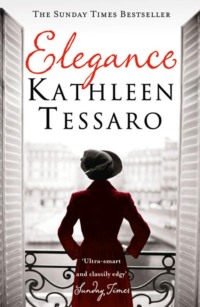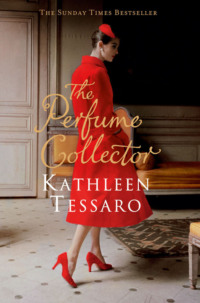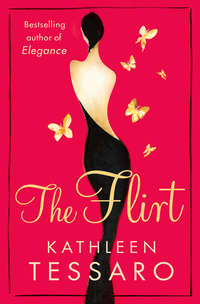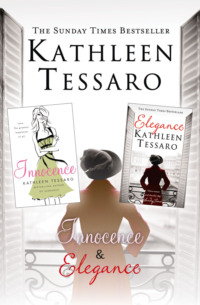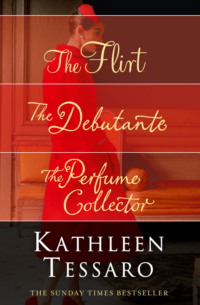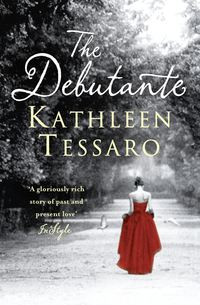
Полная версия
Innocence
She grins, basking in the glow of my small-town admiration.
‘I…I may be living in New York soon,’ I venture.
‘Oh yeah?’
‘I have an audition for Juilliard next month.’
‘I see.’ Her face is hard and unyielding, like a door slammed shut. ‘Those auditions are fuckers. Bunch of self-satisfied cunts, if you ask me.’
‘Oh.’
A bus careers past, forcing a rush of cold air into the room. Robbie turns away. I follow her gaze but all I can see is an empty bookcase and the glossy black surface of the television screen.
‘I mean, it’s not like I’ll get in or anything. It’s just, it’s Juilliard, isn’t it? Everyone auditions for Juilliard!’ I laugh, or rather, I make the kind of wheezing sound that could be a laugh if levity were involved.
We listen to the music and sip our drinks.
Suddenly she smiles and the door swings open again. ‘Hey, don’t mind me! You’re going to find it out sooner or later so I might as well tell you now: I’m a shit actress.’
I’m stunned. ‘Oh, I’m sure that’s not true, Robbie!’
She holds up a hand to stop me. ‘No, it is true. Believe me. I auditioned for Juilliard three times. And NYU and Boston and, well, just about everywhere else on the planet Earth. Look, it doesn’t even bother me.’ Her voice is breezy. ‘I’ve made my peace with the whole thing. Really’
At eighteen, I don’t know anyone who’s made their peace with anything, let alone a devastating admission of their own artistic limitations. It’s threatening to me…how can she even say these words out loud? I’ve an overwhelming desire to change her mind.
‘I’m sure you are good, Robbie! I mean, sometimes it takes years for people to grow into their type. And while that’s happening it can be very awkward. After all, not everyone’s an ingénue.’
‘You are, aren’t you?’ Stretching her legs out, she nestles back into the sofa. ‘So, tell me how you got started.’
She’s changing the subject.
‘I don’t know’ I lean back in the chair. ‘I did a play, in grade school. I was a little taller than the others…actually, I was put back a year. The truth is, I couldn’t read properly or tell time or anything…’
I don’t know why I’m telling her this. I’ve only known her about half an hour. But, instinctively, I feel safe. There’s an energy about her; a lightness I’ve never encountered in anyone before, like something’s missing. And where a thick layer of convention and criticism would normally be, there’s only air.
‘That’s dyslexia,’ she says matter-of-factly.
‘Really?’ My parents were so embarrassed by my backwardness, it was never discussed. ‘Are you sure?’
‘Trust me, I’ve spent more time in clinical physiological testing than you can imagine. Go on,’ she urges, making that sound normal too.
‘Oh.’ I’m thrown by my unexpected diagnosis. ‘Well, when I was growing up, in the Virgin of the Sacred Heart Girls School, you were just thick. Anyway, there I was, a bit stupid and definitely spacey, taller than all the other girls and pretty weird-looking because my mother really wanted a boy—she used to cut my hair short—and then I got the leading role in the school play because I was tall with short hair.’
A tenderness washes over her features. ‘And you were good at something!’
I stare at her. ‘How did you know?’
‘It’s always the same. You want to be someone else and then you are and people applaud…’ She grins. ‘Your secret’s safe with me.’
‘It was the only time I can remember feeling like I belonged in my own skin. No one really wanted to hang out with me until then. And then my parents came along.’ I see my mother’s bright smile, my father wearing a tie, sitting in the front row of the school auditorium. ‘They were proud of me. They’d never been proud before. That’s when I made up my mind I was going to be an actress.’
She’s still and quiet; frowning at the floor.
I’ve said too much. The anxious, naked feeling I grew up with returns. Suddenly I’m back in school with my short hair and ugly uniform, trying too hard to make friends with the cool girls.
‘I can tell the time now,’ I add quickly. ‘It just took a little longer.’
She laughs; the frown vanishes and with it my awkwardness.
‘What about you?’ I ask.
‘Me?’ She presses her eyes shut. ‘I’ve been acting all my life!’
‘So you must be good,’ I persist.
‘You know what?’ She sits up. ‘I’m not even that interested in it.’ And, leaning back, she wiggles her red-painted toes, admiring her handiwork.
For a moment, I can hardly speak. ‘But…but, why are you here, then?’
‘Oh, darling!’ She smiles at me indulgently. ‘Who in the world wants to get a job? And besides, I know I’ve got some sort of talent; it’s just I haven’t really found my milieu yet. It’s all simply a matter of time. Never mind.’
She lights a fresh cigarette, the glow of the flame illuminating her porcelain skin. ‘So, what I’m wondering, Raven…’
I flinch. ‘That sounds really odd to me.’
‘You’ll get used to it. So what I’m wondering is, I have this great date with Hughey Chicken and he’s got a friend he’s supposed to meet tonight in Camden. So I’m thinking that maybe you’d like to come along too. A kind of double date.’
‘You mean a blind date.’
‘Yeah, well. I guess, if you want to look at it that way’
What other way is there to look at it?
‘Actually I have a boyfriend. He’s a graphic artist at CMU.’
She looks at me. ‘And…?’
‘Well, I’m not into being unfaithful or anything. I mean, we’re probably going to live together when I get back.’
‘Relax! I wasn’t suggesting you offer him bed and breakfast. We were just going to hang out. After all, it’s London! Don’t you want to meet people? Have fun?’
I hesitate.
Obviously the cool thing to do is say yes. But what if he turns out to be ugly? Or weird? Or even not ugly and weird but out of my league—handsome and cool? I think of Jonny; of his funny, crooked smile. If it’s only to hang out, I guess it doesn’t matter. He’s not possessive. And it’s not like I’m going on my own…But what would I wear? I’ve only just got here; I haven’t even unpacked.
Robbie’s smiling at me, swinging her legs. ‘So, what do you think? We’re going to meet in this pub and then go on to see a band at the Camden Palace.’
‘I…I don’t know.’
‘Rave…’ She’s already shortening it. I now have a nickname from a name that isn’t mine. ‘Rave, the thing is, I don’t know Hughey either. See? So it’ll be fun. An adventure!’
I don’t know why this makes sense but it does. (The sidecars may have something to do with it.) ‘OK, sure. To keep you company, that’s all. But if it’s all the same to you, I think I’ll use my own name tonight.’
She shrugs her shoulders. ‘Fine. But I wouldn’t mention your last name if I were you.’
The front door opens.
‘Hello!’
‘We’re in here!’ Robbie calls. ‘Getting drunk!’
A young girl in an ill-fitting brown coat peers in. She looks about fifteen, with heavy, straight, shoulder-length hair pinned back from her face by a bright pink barrette, and enormous round blue eyes. She’s carrying a stack of books—a thick, leather-bound reprint of Shakespeare’s first quarto, a Penguin guide to Romeo and Juliet, a copy of The Seagull and a well-thumbed edition of Chekhov’s short stories.
‘Hi.’ She crosses the room and holds out her hand. ‘I’m Imogene Stein.’
I stand up. ‘Evie Garlick. Pleased to meet you.’
‘Evie’s coming with me to meet Hughey Chicken!’ Robbie beams, raising her mug.
‘Better you than me,’ Imogene carefully places her books on the floor and shrugs off her coat. Underneath, her dress is a drop-waisted pinafore affair, at least two sizes too big and her shoes are the kind of solid, brown oxford lace-ups my grandmother favoured. ‘What are you drinking?’
‘Sidecars. Want me to make you one?’
‘Yes, please.’
Robbie gets up and Imogene collapses onto the sofa. ‘I don’t suppose you’ve got a fag?’ she pleads. Robbie chucks her the packet before heading into the kitchen.
I watch as she lights up. There’s something wrong with this picture. She looks like a Laura Ashley poster child but sucks deeply and greedily, throwing her legs over one another like a forty-year-old prostitute after a long night.
‘So,’ I take a stab at conversation. ‘You’ve been out?’
Nothing like stating the obvious.
She passes a hand over her eyes. ‘Rehearsing. The Seagull.’
‘Yeah? Which scene?’
‘The last one. You know, ‘I’m a seagull. No, I’m not. Yes, I am.’ She takes another drag and for a moment it looks like she might inhale the whole thing in a single go.
‘That’s a great scene.’ I try to sound encouraging. ‘And a killer speech.’
She nods, exhaling a stream of smoke from her nose. ‘Yep. I am a seagull. I am definitely a seagull.’
We sit in silence.
Maybe she’s a method actress. Method actresses take their work very seriously.
I catch her eye and smile.
She stares at me. And then, to my horror, her eyes begin to fill with tears.
Shit. If she thinks she’s a seagull, we’re in real trouble.
‘I love him. I love him and he doesn’t even know I’m alive!’ She buries her face in her hands.
Is she in character? Should I be improvising with her? I stand up. ‘I think I’d better unpack or…something…’
‘But I love him! I know he’s the one! I just know it!’
Robbie comes back in and hands her a teacup minus a handle. ‘He’s gay, Imo. Everyone knows it. Sorry. We’re out of mugs.’ She refills my drink from a tarnished silver gravy boat.
‘He’s not gay!’ Imo hisses. ‘Just English!’
‘He wears cashmere socks, thinks football is violent and lives with a man named Gavin. Who’s an organist,’ Robbie adds. ‘Face it. He’s gay. Of course, you don’t have to believe me but I did grow up in the Village and if I can’t spot a gay man then I must be blind.’
‘Who are we talking about?’
‘Imo’s scene partner, Lindsay Crufts. He’s very handsome, extremely well-spoken and a total ass jockey’
‘Robbie!’ Imo glares. “Ass jockey” is not a term I want to hear again to describe the love of my life!’
Robbie winks at her. ‘Golly but you’re cute when you’re angry!’
‘You know’—Imo shakes her head—‘for a girl who’s about to shag some loser by the name of Mr Chicken, you’ve got a lot of nerve!’
Robbie giggles. ‘You are so jealous!’
‘Yeah, right!’
I’m on the edge of this conversation, dying to join in. I raise my mug grandly. ‘And while you’re shagging Mr Chicken, I’ll be stuck shagging Mr Chicken’s mysterious friend!’
They both look at me and laugh.
I laugh too. But I don’t know why.
Imo pauses for breath. ‘You don’t have any idea of what shagging means, do you?’
‘Sure,’ I flounder. ‘It’s dating, right?’
‘Fucking,’ Robbie explains. ‘Shagging is English for fucking. Makes it sound like a carpet.’
I dismiss it like it’s old hat. ‘Yeah, I knew that. I just got…confused.’
They exchange a secret smile.
I’m not sure I like them. I hate the way they both know how to smoke and mix drinks and the bathroom’s disgusting…maybe I should find my own place.
There’s a knocking, or rather a pounding, at the front door. ‘Hello! Hello!’
‘Shit! It Mrs Van Patterson, the landlady. Have you met her?’
I shake my head.
‘She’s a total nightmare. Dutch. And tight as they come.’ Robbie prods Imo with her big toe. ‘You get it. She likes you.’
‘Does not!’ Imo pushes her foot away. ‘You go.’
‘She hates me! At least you look like a virgin.’
‘I am a virgin.’ Imo sighs. She puts down her teacup and pulls herself off the sofa. ‘Fine! Send the virgin. The virgin will do it!’ And she grumbles her way to the front door.
I lean across to Robbie. ‘Don’t you think she’s a little young to be drinking?’
Robbie shakes her head. ‘She’s nineteen. Not that you’d know it. Her father’s this big Hollywood agent. Bags of money. But her mother’s a total freak. Dresses her like a twelve-year-old, insists that she calls her every day. She’s a Born Again. Really into Jesus. It’s so sad, really’
‘But her name’s Stein. That’s Jewish, right?’
Robbie nods. ‘Ever heard of Jews for Jesus?’
I haven’t. But I’m tired of being the odd one out.
I give an all-purpose response. ‘Fuck!’
‘Exactly!’ she agrees.
We can hear the front door open and she signals to me to be quiet.
‘Hello, Mrs Van Patterson. How are you this afternoon?’
‘You girls are using too much hot water! The electricity bill is enormous! It’s outrageous how much water you use! The boiler is on a timer! You must not press the immersion button. Ever!’
‘But the hot water runs out every time we do the dishes. Or if one person has a shower.’
‘Really! I’ve never seen anything like it! What are you doing? Bathing every day?’
‘It’s been known to happen.’
‘Listen, don’t you get smart with me! Twice a week is more than enough.’
‘Where I come from, it’s completely normal to bathe every day’
‘Where you come from, people are spoilt! Americans think the world is made of money! You girls don’t know how lucky you are! Gloucester Place is one of the finest addresses in London. Have you ever played Monopoly?’
‘Yes, Mrs Van Patterson, I have.’
‘Well, it’s like Park Lane. It’s not on the Monopoly board but it could be.’
‘Humm…’
There’s a weighty silence.
‘Have you girls been smoking in there?’
‘No, Mrs Van Patterson! Of course not! Why? Can you smell smoke?’
‘Yes, I can smell smoke!’
Imo lowers her voice. ‘I think it’s the guys upstairs. I mean, it’s none of my business. But I’m pretty sure I’ve caught them lighting up in the hallway a few times.’
‘Ahhaa. I see. Right. You are a good girl, Imogene Stein. A nice, well-mannered girl. Much better than that roommate of yours. But you must not use so much hot water, OK? Right?’
The door shuts and we can hear Mrs Van Patterson stomping upstairs.
Imo comes back in and sits down. ‘Well, another near miss for the House of Chekhov’ She raises her teacup.
Robbie and I look at each other, then raise our mugs too. ‘I’m a seagull!’ we chorus.
Imogene smiles. She’s young and old, all rolled up at once.
‘Yeah, that’s me. I’m a seagull. So’—she taps another cigarette on the side of the box and lights it, propping her legs on the coffee table. ‘Anyone fancy a nice, long bath?’
Standing on the front doorstep in the wind and rain, I fumble in my jacket pocket for my keys. And then I turn and check one last time.
No, she’s definitely not there. Not hovering behind the laburnum or waiting on the other side of the gate.
Not that I really believe in ghosts.
But seeing Robbie is different.
She wasn’t filmy or white or in any way vaporous or ‘ghostly’. In fact, she looked normal, solid, wearing a pair of jeans and one of those ugly orange sweaters she’d knitted when she thought her true calling was as a knitwear designer. (She never stopped searching for her calling; every year there was a new one. And that year we all got jumpers. I still have a couple—one in fuchsia and another in a kind of toxic-waste green. They manage to be both too tight and too loose all at once; I think the neck hole is really an armhole and the armholes neck holes. She called it her ‘signature piece’.)
By the time class ended she was gone. I looked for her, walking to Covent Garden tube station; I half expected to see her trailing behind me, lingering in the shadows of Drury Lane or even standing on the train platform, reading a copy of Vanity Fair. She used to like Covent Garden, was forever picking up Australians in one of the bars in the market.
But she wasn’t there.
And she isn’t here now.
Of course, I must’ve imagined it. It’s amazing what a little insomnia and a few missed meals will conjure up in a girl. I should be relieved. But instead, strangely, I’m disappointed. The older you get, the more friends you lose to marriage, children, work; to adulthood. Friendship itself becomes an apparition; a fleeting spectre, too quick to evaporate in the glaring light of day.
I turn my house key in the lock of the enormous scarlet-painted door.
Number seventeen was once a formidable, cream-coloured, stucco-fronted Georgian property, very similar to all the other formidable, cream-coloured, stucco-fronted Georgian properties of Acacia Avenue, north London. Now, it’s seen better days. It’s the only house on the street whose garden gate squeals like an angry piglet each time it opens, or whose vanilla exterior is peeling away like shavings of white chocolate on a posh wedding cake. And, in a neighborhood where neat little box hedges and topiary bay trees are de rigueur, the garden has definite romantic, wild, overgrown tendencies; much more Brontë than Austen. In summer, the fig tree drops its heavy fruit to form a thick, gooey compote on the pavement below and each autumn the towering chestnut launches conkers at passers-by with eerie accuracy. A defiant, shabby grandeur has replaced its once impeccable façade. But in the five years I’ve lived here it’s only grown more intriguing.
It’s not your average house share. But then again Bunny Gold, its owner, is not your typical landlord either.
When Bunny’s husband, Harry, died unexpectedly ten years ago, it came to light that he’d been, in addition to a loving husband, father, a respected pillar of the Jewish community and owner of an extremely successful accountancy firm, also a chronic gambler.
He’d already cashed in his pension, life insurance and a great deal of their personal savings to meet his debts. Bunny, who’d spent her entire life in a cosy bubble of shopping, socializing and raising their only child, Edwina, was devastated. An affair would’ve been one thing. But leaving her in financial ruin was much worse. Above all, she was unprepared to part with her beloved home.
So she began to rent out rooms, although she’d be shocked to hear it described as a ‘house share’. To her, our living arrangements are the result of an intimate form of artistic sponsorship; she’s a patron rather than a landlord and will only let rooms to performers or artists whose work she admires. And, at seventy-two, her enthusiasm for almost any form of music, painting, dance, or drama, along with her remarkable appetite for the avant-garde, is nothing less than inspiring.
So, there’s me, the actress/teacher, Allyson, an Australian opera singer/teacher and our latest arrival, Piotr, a concert pianist/teacher from Poland.
And, of course, the love of my life, Alex. We share a couple of rooms and a private bathroom at the very top of the house, overlooking the garden at the back.
We are the privileged few.
Postcards from all over the world regularly filter in from previous tenants, along with invitations for Bunny to visit them in Rome, Paris, New York, Berlin…I’ve known a few of them myself over the years. As Bunny says, ‘Evie, if this goes on much longer, one of us is going to have to propose!’
And she’s right. I should get myself together and move on. But it’s never quite as easy as it sounds. Whole years have evaporated, just waiting for the kettle to boil. Maybe one day I’ll be the one sending postcards, even if I only get as far as south London.
But right now, I’m just grateful to be home.
Dumping my bag and coat down on the reindeer antler coat-stand in the front hallway (the work of a Norwegian furniture designer who lived here two years ago and now designs plastic chairs for Habitat), I make my way down to the kitchen for a cup of tea and a ferret around the fridge, only to find Allyson and Piotr arguing about lieder.
They barely notice me as I fill up the kettle and switch it on. Both are fairly formidable; it’s like a scene from Twilight of the Gods. Piotr is incredibly tall and slender; he moves with a confident, swaggering ease, unusual for a man of his height. His dark hair’s cut quite short at the back but still manages to tumble into his eyes, which are a particularly warm shade of brown; the concentrated golden walnut of a tiger’s eyes and equally intense. However, his hands are his most remarkable feature. They’re Rachmaninov hands, vast and powerful; each one easily the size of a grown man’s face. He’s only been here a week and I’ve never heard him say more than three words together. So it’s quite a surprise to hear him speak in full sentences.
Allyson, on the other hand, is going through her Maria Callas stage. If Piotr’s hands are his most distinguishing feature, Allyson’s cheekbones are hers. They’re like two evenly spaced shelves upon which her heavily made-up, green-grey eyes are balanced. Her long auburn hair is scraped back into a perfect chignon and she’s solidly, dramatically, emphatically curvy or, as she puts it, ‘ample yet agile’ (the world of opera being much more image conscious than it used to be). But despite her impeccably groomed exterior, she possesses the mouth of a merchant sailor. After struggling in England for three years now, she’s just beginning to cover roles at Covent Garden and sing a few major parts for Opera North and the Welsh National. That, along with a steady stream of young students, keeps her permanently occupied. But her real chance is coming next month. She’s due to perform a recital of lieder at St John’s Smith Square and has had her heart set on being able to rehearse with Piotr. But now it looks like she’ll have to rehearse alone.
(This is one of the few advantages to shared housing: not all the dramas are your own.)
I move silently to the draining board and retrieve a mug.
‘But why?’ Allyson gestures wildly to the heavens; a move she used to great effect in a regional production of Tosca last March. ‘Give me one reason why not? For fuck’s sake! I’ll pay you whatever you like!’
Piotr leans against the kitchen counter, his hands in his jeans pockets, amused. ‘I’ve already explained to you. German is not a language that anyone should be singing! Ever! Italian, yes. French, OK. Russian, perfect! But German? Sounds like…like a noise you make when you, you know, spit!’ And he demonstrates the noise.
I put the mug down. Maybe I’ll give the tea a miss.
A slice of toast pops up in the toaster.
‘But you play German music! You play Beethoven, Mozart, Liszt…’ Allyson continues.
Piotr tosses the toast onto a plate, opening drawer after drawer in search of a knife.
I hand him one.
‘Thank you. Liszt is not German.’
He looks around.
‘Don’t be so pedantic!’ Allyson accuses, pushing the butter dish across to him.
He sighs, spreading the butter thick. ‘When I play Beethoven or Mozart, I don’t have to listen to German. I listen to music. When I have to listen to German, there’s no longer any music.’ And he shrugs his shoulders; a rolling, slow-motion version that’s somehow distinctly Eastern European. ‘I’m sorry’
Allyson turns away, unable to combat this curious logic with anything but a stream of obscenities.
Piotr, apparently oblivious, turns to me instead, munching his toast. ‘How was your class?’
‘An old man walked out on me,’ I confess, sidestepping Allyson, who’s spluttering under her breath in the corner. ‘He only ever wants to read one poem. One incredibly long poem.’
‘Good for him! So important to stick to your ideals, don’t you think?’
He grins. Allyson growls threateningly.
‘And you? When are we going to see you perform?’
I laugh, a nervous, high-pitched little trill. Suddenly I’m wrong-footed; an intruder in this conversation of artistic preferences and ideals. ‘Oh, no, I…I don’t really do a lot of performing any more. I’m really just a teacher now’
He raises an eyebrow.
I fumble about with a box of tea bags. Even without looking up, I know he’s staring at me.


